People who eat fish a few times a week are slightly less likely to suffer from a stroke than those who only eat a little or none at all.
Fish does provide a beneficial package of nutrients, in particular the omega-3 fatty acids, vitamin D, selenium and certain types of proteins those may have stroke related benefits.
The incidence of stroke in US is about 800,000 in a year, and 136,000 die from it. Smoking, drinking, obesity, high blood pressure and high cholesterol are in particular linked to a higher risk of stroke.
In several studies, it had been seen that the people who ate fish the most were 12% less likely to have a stroke than those who ate the least.
People who ate more fried fish and fish sandwiches didn't get any stroke benefit, surprisingly.
Fatty fish such as salmon and herring are especially high in omega-3s. The American Heart Association recommends at least two servings of fatty fish in particular in each week.
Omega-3 fatty acids are unsaturated fatty acids; those help to reduce inflammation and act as antioxidant; work to decrease the bad fat, LDL (Low Density Lipoproteins). These are essential fatty acids and are not synthesized in the body; so has to be supplemented from food.
Omega-3 fatty acids are abundantly found in fish oil. Most omega-3 rich fishes are;
- Salmon,
- Mackerel,
- Herring,
- Lake trout,
- Sardines,
- Albacore tuna,
Less omega-3 rich fishes are;
- Cod,
- Haddock,
- Catfish,
- Sole etc.
It is recommended that fish to be consumed baked or grilling to retain the beneficial oils and other nutrients.
...
Click here to Subscribe news feed from "Clinicianonnet; so that you do not miss out anything that can be valuable to you !!
...






